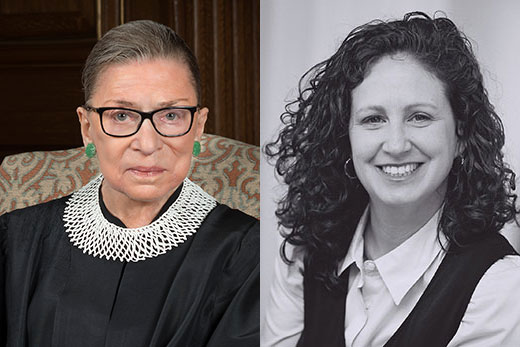Having watched coverage of Justice Ruth Bader Ginsburg slip into hagiography, especially since her death in September 2020, lawyer and journalist Dahlia Lithwick wants to frame her career more accurately. The fruits of that project will be evident in “The Demand for Justice: Ruth Bader Ginsburg and the Jewish Tradition” — this year’s Jacob M. Rothschild Memorial Lecture — which Lithwick will deliver virtually Thursday, Nov. 11, at 7:30 p.m. under the auspices of the Tam Institute for Jewish Studies.
The mugs, tote bags and dissent collars flying off the shelves risk “thinning the narrative around who Justice Ginsburg was, what she did and why she mattered,” says Lithwick. Senior editor at Slate, senior fellow of the Shalom Hartman Institute’s Kogod Research Center and a lecturer at the University of Virginia School of Law, Lithwick warns that “the mythmaking makes us miss the much deeper, more important part of her story.”
So, how should we understand the larger-than-life justice many now familiarly call RBG? According to Lithwick, Ginsburg is emblematic of an American, Jewish, midcentury liberal — one who believed the law is best used to effectuate social justice and equality.
Ginsburg, who grew up in a working-class Brooklyn neighborhood, was aware of the perils for those of her faith. Refugees from the Holocaust lived nearby. Driving with her parents, she saw signs that said, “No dogs, no Jews.”
Gender also made Ginsburg an outsider. Notes Lithwick, “Justice Ginsburg had to fight her way into college and law school. She couldn’t get a clerkship or legal position when she graduated. In a lot of ways, the Jewish American success story eluded her.”
But that outsider status conferred compassion. Ginsburg, for example, understood what it felt like for women who wanted to be educated at the Virginia Military Institute and had been told no. Lithwick will chart Ginsburg’s pathbreaking advocacy for gender equality, a topic especially relevant as women’s reproductive rights have reemerged on the Supreme Court’s docket.
‘The day of the 100 emails’
For years, Ginsburg was part of Lithwick’s beat. She recalls when she learned it was a two-way street. A reporter asked Ginsburg whose work she enjoyed. Her answer? “I have this person I read at Slate. She is spicy.” Lithwick’s inbox exploded.
In what Lithwick describes as “the biggest honor of my life,” Ginsburg agreed to be part of a Slate series on the eight other women who were part of Ginsburg’s Harvard Law class of 1959. Lithwick secured one of the last audio interviews with Ginsburg, whose health was in decline by early 2020. Nonetheless, Ginsburg readily assented because “she loved the idea of giving her classmates the attention she thought they deserved,” says Lithwick.
There is more than one ‘lady justice’
Lithwick is putting the finishing touches to a book, “Lady Justice,” that she laughingly describes as “both about, and not about, Justice Ginsburg.” It profiles women lawyers who took actions such as suing on behalf of those harmed by the Trump administration’s executive orders limiting travel from several predominantly Muslim countries and the 2017 “Unite the Right” rally in Charlottesville.
“Not everybody gets famous or remembered by history,” observes Lithwick, “but these women were the spine supporting some big legal victories.”
In addition to the Tam Institute, co-sponsors of the event include Emory’s Bill and Carol Fox Center for Humanistic Inquiry; Center for Ethics; Center for Women; Departments of German Studies, History, Middle Eastern and South Asian Studies, and Religion; Office of Spiritual and Religious Life; and School of Law.

